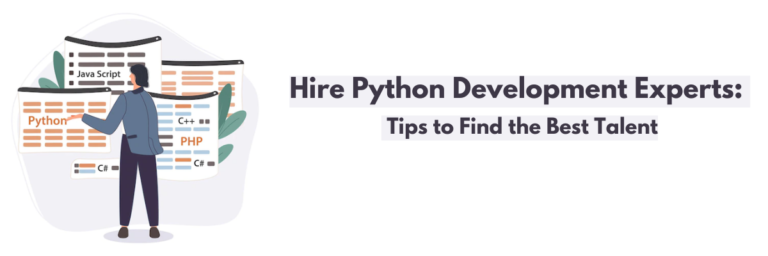5 Best Practices for Hiring Data Scientists
In today’s digital world, hiring data scientists are a vital part of any successful organization. As data becomes increasingly important for businesses, the demand for skilled data scientists is constantly growing.
But how do you go about finding and hiring data scientists for your business? Here are some best practices for hiring data scientists to consider.
As data science becomes more and more important in the business world. hiring data scientists has become a priority for many businesses.
But it’s not always easy to find the right person for the job; data science is a complex and nuanced field. it can be difficult to identify the best candidate for a particular position.
Here are some tips on how to hire data scientists that will help make sure you find the right person for your team.
What is Data Scientist?
Data Scientists are professionals that specialize in working with massive amounts of data. Through the use of sophisticated tools and algorithms, these experts utilize various types of data to generate insights about what is happening within a business or industry.
With their combination of skills in math, engineering, statistics, computing, and mathematics, these experts can analyze trends and patterns from different sources to drive important decisions and strategies.
When armed with the right technology, and data-driven strategies, Data Scientists can develop innovative solutions to help organizations meet their goals. Ultimately, they play an integral role in helping organizations stay one step ahead of their competition.
They use their analytical, coding, and statistical skills, as well as their knowledge of all things data-related, to find patterns and gain insights from large amounts of data.
By becoming experts in mathematics, computer science, and business principles, they are able to draw actionable conclusions that help businesses increase efficiency, come up with better products and services, and also gain a competitive edge.
Data Scientists often work on projects. Such as building predictive models using machine learning algorithms, designing customer segmentation programs, or analyzing website interactions.
All of these activities require sharp problem-solving skills and strong communication abilities. To ensure that what they uncover is not only accurate but can be effectively conveyed to the desired audience.
Best Practices for Hiring Data Scientists
Hiring data scientists can be a daunting task in today’s job market. This increasingly important profession requires a unique skill set that combines analytics, coding, and communication.
Companies looking to hire these professionals need to demonstrate they can offer competitive salaries. While also providing opportunities for professional growth.
If you want the cream of the crop, look to universities and institutions with strong technical and analytical programs – these are often the best sources for talented candidates.
When hiring data scientists, make sure to keep an open mind; sometimes the most promising applicant is an unexpected one!
1. Know What You Need
Before beginning your search, it’s important to take an inventory of what your company needs from hiring data scientists. Do you need someone who specializes in Python?
Are you looking for someone with experience in machine learning algorithms? Knowing what specific skills you need will help narrow down your list of potential candidates.
2. Know Who You’re Looking For
When it comes to hiring data scientists, it’s not just about finding someone with the right technical skills; personality matters too. Look for people who have strong problem-solving skills and an eagerness to learn new things.
They should also be able to work both independently and as part of a team. Since data science often involves collaboration with other departments.
Additionally, look for people who have strong communication skills; they should be able to explain their work clearly and concisely. So that other members of the team can understand their findings.
3. Focus on Culture Fit
When hiring data scientists, don’t just focus on technical skills – also consider culture fit. If a potential employee’s values don’t align with those of your organization. They may not be the right fit for your team in the long run.
Take some time to get to know each candidate during the interview process and ask questions about their goals and interests outside of work. So that you can determine if they’d be a good cultural fit for your organization.
4. Look at Experience
Once you know what type of data scientist you’re looking for, start narrowing down your list by looking at each candidate’s experience.
Look at their past projects and roles to see if they have experience in the areas that your company needs.
Additionally, look at their educational background; many companies prefer candidates with a master’s degree or higher in computer science, mathematics, statistics, or related fields when hiring data scientists.
5. Set Up Interviews
Now that you have narrowed down your list of potential candidates, it’s time to start setting up interviews. During these interviews, ask questions about their technical skills as well as their ability to work independently.
You should also ask about their experience with different types of software programs and tools used in data science jobs.
This will help you get an idea of how well they will fit into your organization and if they possess the necessary skillset required for success in hiring data scientists.
The Essential Role of the Data Scientist
A Data Scientist is responsible for collecting, analyzing, and interpreting data to uncover insights that can help solve complex problems.
They are the bridge between the technical world and the business world, as they use their skills in mathematics, programming, and statistics to develop models and algorithms. That can be used to predict outcomes or inform decisions.
1. Data Collection & Analysis
Data scientists have a deep understanding of how to collect, organize, and analyze large amounts of data from various sources.
They must be able to identify patterns, trends, and correlations within the data. They use these insights to develop strategies that can help companies make better decisions.
Additionally, they must be able to communicate complex topics in an easy-to-understand way that can be used by non-technical audiences.
2. Data Visualization & Reporting
Data visualization is an important part of any successful data science project. As it helps bring meaning to raw numbers and figures. Data scientists use various tools such as charts, graphs, infographics, etc.
To display their findings in an understandable fashion. Furthermore, they must be able to explain their findings in presentations or reports so that non-technical audiences can understand them.
This requires them to have excellent communication skills and be able to present complex topics in simple terms.
3. Developing Machine Learning Algorithms
Data scientists are also often tasked with developing machine learning algorithms that can automate certain processes or tasks within organizations.
This requires them to have extensive knowledge of AI technologies such as natural language processing (NLP) and deep learning (DL).
Additionally, they must be familiar with programming languages such as Python or R in order to effectively build algorithms that can accurately predict outcomes based on large datasets.
Building a Successful Data Science Team
As companies embrace the data-driven revolution, there is an increasing need for talented data scientists. For businesses to succeed in this new era of data-driven decision-making, they must have a strong team of data science professionals.
To build the best possible data science team, companies need to focus on recruiting and retaining top talent, providing ample resources and support, and fostering a culture of collaboration and innovation.
1. Recruiting Top Talent
One of the most important steps in hiring data scientists is to recruit top talent.
Companies should look for individuals who have both technical skills (such as programming languages like Python) and soft skills (like communication, problem-solving, and critical thinking).
Additionally, it is important to recruit people with diverse backgrounds who can bring different perspectives and experiences to the team. This type of diversity ensures that all points of view are represented when making decisions or solving problems.
2. Creating a Clear Plan of Action
The first step in hiring data scientists is to create a clear plan of action. This involves defining your goals, identifying what skills are necessary to achieve those goals, and deciding on the budget and timeline for your project.
It’s also important to consider any external resources you may need. Such as software or hardware systems that could help you achieve your objectives. Once you have outlined your plan of action, it’s time to start looking for candidates.
3. Identifying the Right People
Finding the right people is key when it comes to hiring data scientists. You should look for candidates with strong technical backgrounds in mathematics, statistics, computer programming, and related fields.
Additionally, these candidates should have experience working with big data sets. And be able to analyze and interpret large amounts of information quickly and accurately.
It’s also important that they have good communication skills so they can effectively collaborate with other members of your team and explain their findings clearly.
4. Creating an Effective Working Environment
Once you have identified the right people for your project, it’s time to create an effective working environment where everyone can thrive.
Make sure that each member of the team has access to all relevant information about their roles and responsibilities before getting started on any tasks.
Additionally, establish clear lines of communication between all members of the team. So everyone is aware of what others are doing at all times.
Finally, set realistic timelines for completing tasks so everyone knows exactly when something needs to be done.
By creating an environment where everyone feels valued and respected will help ensure the success of your project.
5. Providing Resources & Support
In addition to recruiting talented people, companies need to make sure that their data scientists have access to the necessary resources and support they need to be successful.
This includes providing them with enough computing power. So they can quickly analyze large datasets and access cutting-edge technology such as machine learning algorithms.
Additionally, it also means offering them training opportunities so they can stay up-to-date on trends in the industry.
Finally, it is important that managers provide their teams with clear direction so they know what’s expected of them.
6. Fostering Collaboration & Innovation
Finally, it is essential that companies foster a culture of collaboration and innovation within their data science teams.
Data scientists should be encouraged to work together on projects. So they can learn from each other’s experiences and share ideas.
They should also be empowered to take risks this will allow them to explore new ideas without fear of repercussion or failure. It is only through collaboration and innovation that a company’s data science team can reach its full potential.
Conclusion
Hiring data scientists can be tricky. But by following these tips you’ll be well on your way to finding the perfect candidate for your organization.
Focus on both technical skills and culture fit when hiring data scientists. And make sure that each candidate’s values align with those of your company before making any offers. With these best practices in mind, you’ll have no trouble finding an excellent addition to your data science team.
hiring data scientists can be daunting but it doesn’t have to be with the right approach. By following these best practices understand your goals and needs, and look at experience. And setting up interviews you can find the perfect candidate to fill this role within your organization.
The key is taking your time when going through each phase of this process. So that you find a qualified individual who will be able to make an impact on your business from day one.
With careful consideration and due diligence throughout this process, finding a great fit for this role shouldn’t be too difficult.









![What is Augmented Reality? | 11 Strategic Benefits of AR for Businesses [2023]](https://saaslyft.com/wp-content/uploads/2023/03/Untitled-design-37-768x309.png)